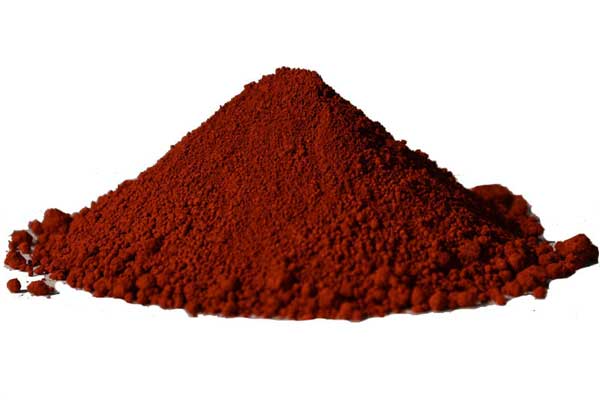Home » Introduction of Iron Oxide Red Production Process
Iron oxide pigment is a very important inorganic color pigment with good pigment quality and a wide range of applications. Iron oxide red is one of the commonly used type in iron oxide. The method of producing iron oxide red is divided into dry method and wet method.
>> Dry Method
>>> Green alum calcination method
The ferrous sulfate containing seven crystal waters is preheated to remove most of the crystal water. Turn green alum into monohydrate green alum at 250℃-300℃. After grinding and pulverizing, it is calcined to obtain iron red at 700℃-800℃. Then carry out the post-treatment of the pigment. Remove the water-soluble salt by washing, and then carry out drying and crushing to obtain the finished product.
The calcination temperature and calcination residence time are the two main factors that control the quality of iron oxide red. When the reaction temperature is low, dehydration is incomplete, and the obtained iron red phase is yellowish. When the reaction temperature is high, blue phase iron red will be obtained. The longer the material stays in the reactor, the more serious the particle agglomeration, the darker the iron red color obtained, otherwise the color of red iron oxide obtained is yellowish.
>>> Iron yellow calcination method
The yellow iron oxide prepared by the wet method is washed with water to remove the water-soluble salt, filtered and dried, then put into the calciner. Calcined into iron red at 600℃-1000℃, then crushed and packaged to obtain finished products.
The calcination of iron yellow into iron red is the process of removing the crystal water from the iron yellow.When the temperature reaches 177℃, the iron yellow can remove the crystal water. When the temperature reaches 300℃, the dehydration has been carried out completely.However, in order to obtain iron red with bright color and strong hiding power, the temperature must be above 600℃. Research results in recent years have shown that there are three main factors affecting the color of iron oxide red in this process. The first is the calcination temperature. The higher the temperature, the more bluish the iron oxide red is, the lower the temperature is, and the more yellowish the red iron oxide is. The second is the particle size of the raw material iron yellow. The larger the iron chloride yellow particles, the bluer the red iron oxide phase, and the smaller the iron oxide yellow particles, the more yellowish red the iron oxide red is. The third is the calcination residence time. Long time, blue phase iron red is obtained, while short time, yellow phase iron red is obtained.
>>> Iron black calcination method
The iron black prepared by the wet method is washed with water to remove water-soluble salts, filtered and dried, then put into a calcining furnace, calcined at 600-1000°C into iron red. Then after crushing and packaging, the finished product is obtained.
The calcination of iron black into iron red is a process of oxidation of ferrous oxide in iron black. When the temperature reaches 371 ℃, iron black can be transformed into iron red. However, to obtain iron red with bright color, the temperature must be above 800℃. The influence factors of black iron oxide particle size, calcination temperature, and calcination residence time on iron oxide red are similar to the yellow iron oxide calcination process.
>> Wet Method
>>> Pure liquid phase method
>>> Iron Flake Nitric Acid Method
Iron flakes react with nitric acid at high temperature to generate iron oxide red seed crystals. The seed liquid is put into a two-step oxidation tank for oxidation, and iron flakes are added. After heating up to 50℃, add ferrous nitrate solution and blow in air to oxidize. Keep the temperature between 80-85℃ and the ferrous ion mass concentration is between 0.01-0.02 g/mL. With the progress of the oxidation process, the content of ferrous ions has decreased. Appropriate addition of ferrous nitrate solution and continuous air oxidation will make the color similar to the standard color.
The iron oxide red particles prepared by the iron flake nitric acid process are small and bright in color and yellowish, but the washing is difficult in the post-treatment process, so the yield is low. At the same time, the process also has the problem of nitrogen oxide treatment.
>>> Iron flake sulfuric acid method
The production of iron flake sulfuric acid red iron starts from the preparation of seed crystals. Under stirring, sodium hydroxide solution is added to the ferrous sulfate solution to make the pH of the reaction solution between 9-11, and the air is blown into intense oxidation, and it matured into a red-brown colloidal suspension at room temperature for about 1h.
Put the seed liquid into a two-step oxidation barrel for oxidation, and add iron flakes. After the temperature is raised to 60 ℃, ferrous sulfate solution is added and air is blown into the air for oxidation, and the temperature is maintained at 80-85 ℃. The mass concentration of ferrous ions is between 0.01-0.02 g/mL. With the progress of the oxidation process, the content of ferrous ions has decreased. Appropriate addition of ferrous sulfate solution and continuous air oxidation will make the color similar to the standard color.
>>> Iron flake nitric acid-sulfuric acid mixed acid method
The previous steps are the same as the iron sheet nitric acid method. When the color is similar to the standard color, add ferrous sulfate solution to make the reaction proceed quickly. If necessary, you can alternately add ferrous nitrate solution and ferrous sulfate solution to speed up the reaction rate.
This production method combines the nitric acid process and the sulfuric acid process well, which not only solves the problem of the subsequent treatment of nitric acid iron red, improves the yield of iron red, but also solves the problem of sulphuric acid iron red color, improve the product quality.

